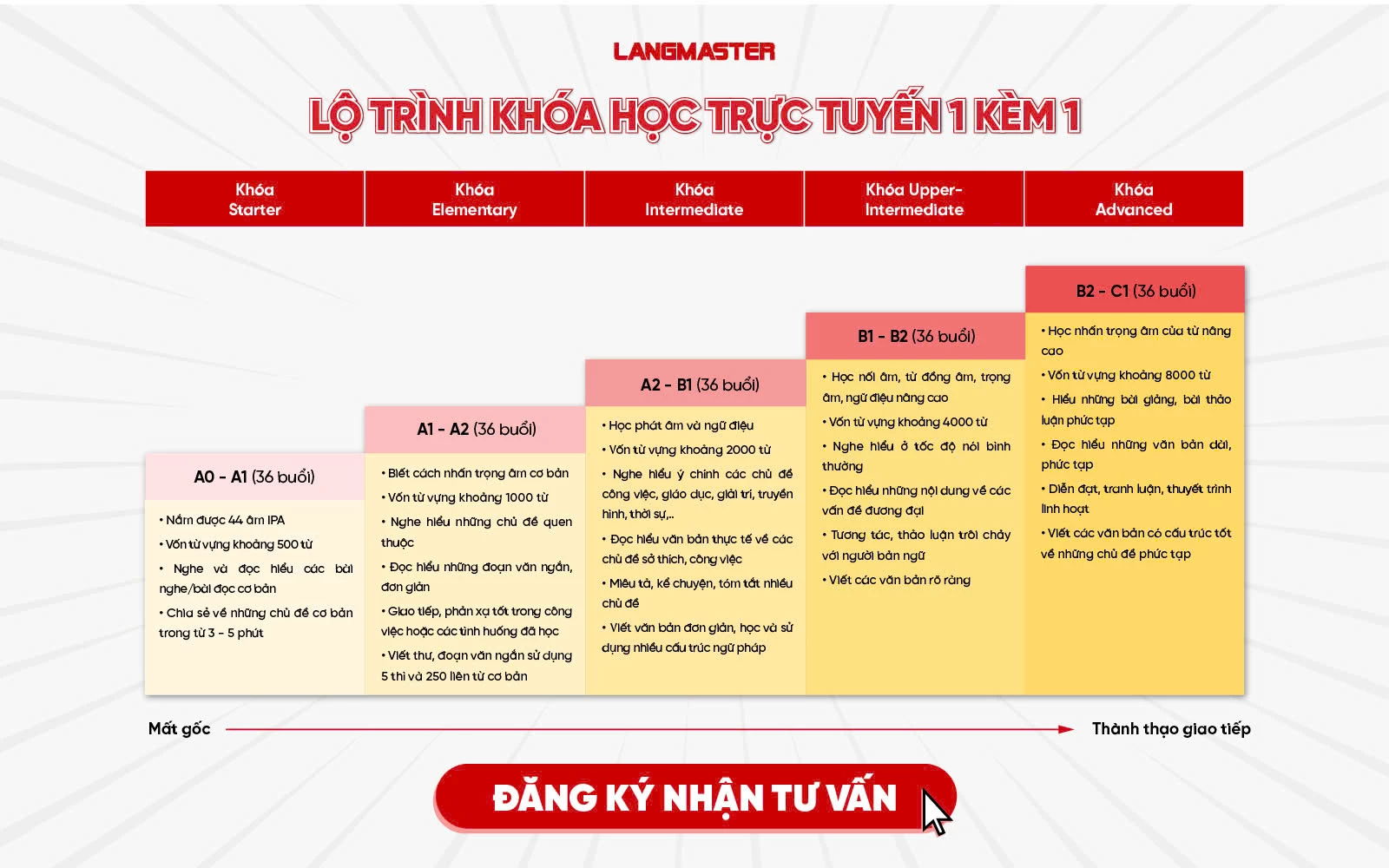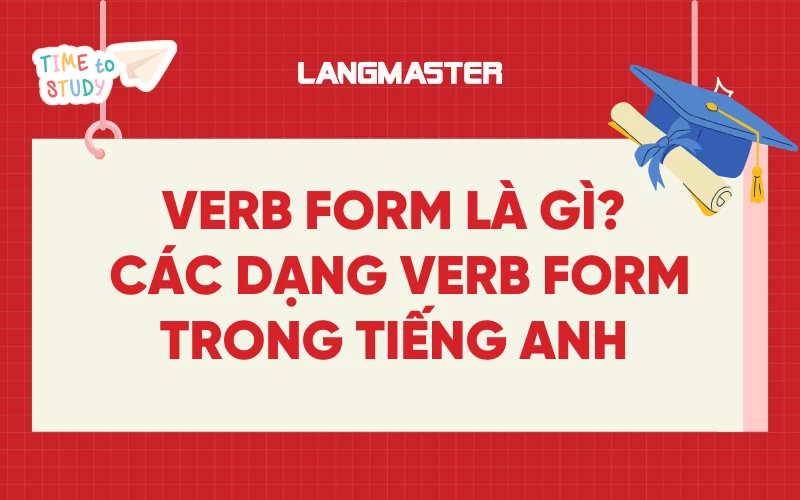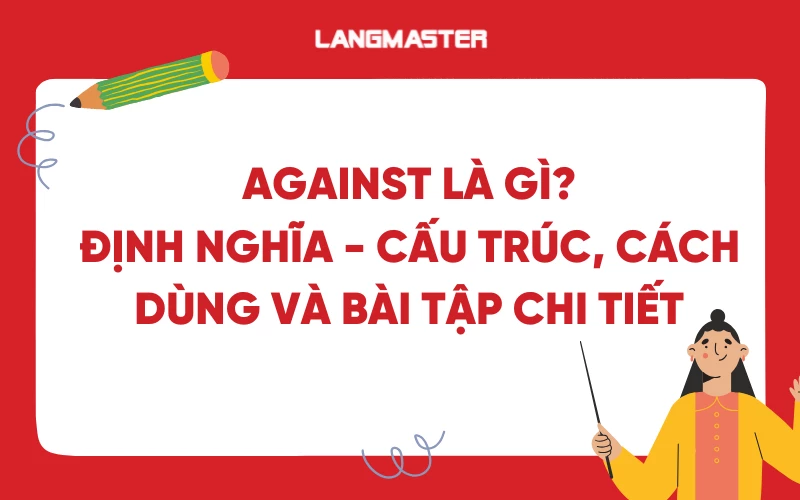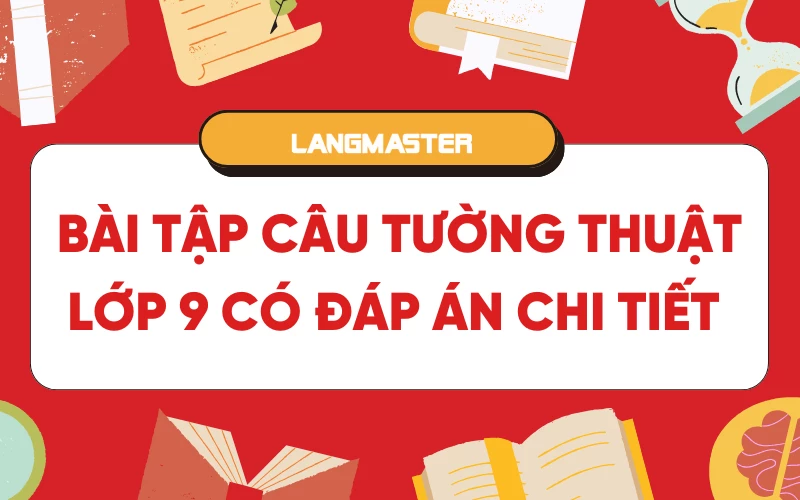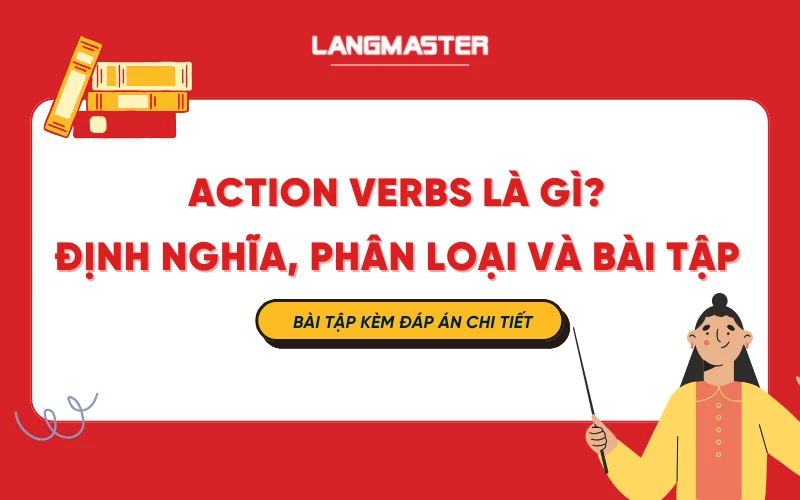Tiếng anh giao tiếp online
100+ Câu bài tập đảo ngữ hay nhất, có đáp án chi tiết
Mục lục [Ẩn]
- 1. Ôn tập lý thuyết câu đảo ngữ trong tiếng Anh
- 2. Bài tập câu đảo ngữ
- Bài tập 1: Rewrite the following sentences so that the meaning is not changed
- Bài tập 3: Rewrite these sentences, using inversion with Only
- Bài tập 4: Rewrite these conditional sentences using inversion
- Bài tập 5: Choose the correct answer A, B, or C
- Bài tập 6: Give the correct form of the verbs in the blankets
- Bài tập 7: Mark the letter A, B, C, or D to indicate the bolded part that needs correction in each of the following questions
- 3. Đáp án bài tập câu đảo ngữ
- Kết luận
Câu đảo ngữ (inversion) là một trong những cấu trúc ngữ pháp quan trọng trong tiếng Anh, giúp nhấn mạnh ý nghĩa và làm cho câu văn trở nên trang trọng hơn. Câu đảo ngữ thường sử dụng trong ngữ cảnh học thuật, bài phát biểu hoặc bài luận và là phần kiến thức không đơn giản. Hãy cùng luyện tập kiến thức về câu đảo ngữ thông qua hơn 100 câu bài tập câu đảo ngữ trong bài viết sau đây
1. Ôn tập lý thuyết câu đảo ngữ trong tiếng Anh
1.1. Câu đảo ngữ là gì?
Câu đảo ngữ (Inversion) là một dạng cấu trúc ngữ pháp trong đó trật tự thông thường giữa chủ ngữ và động từ bị thay đổi. Thay vì theo trật tự S + V (Chủ ngữ + Động từ) như trong câu khẳng định thông thường, một số trạng từ, cụm từ hoặc cấu trúc đặc biệt yêu cầu đưa trợ động từ hoặc động từ chính lên trước chủ ngữ.
Ví dụ:
- Câu thường: She had never been so happy. (Cô ấy chưa bao giờ hạnh phúc như vậy.)
- Câu đảo ngữ: Never had she been so happy. (Chưa bao giờ cô ấy hạnh phúc như vậy.)
Trong câu trên, trạng từ "Never" được đặt lên đầu, kéo theo sự thay đổi trật tự của trợ động từ “had” lên trước chủ ngữ “she”, giúp câu văn nhấn mạnh hơn.
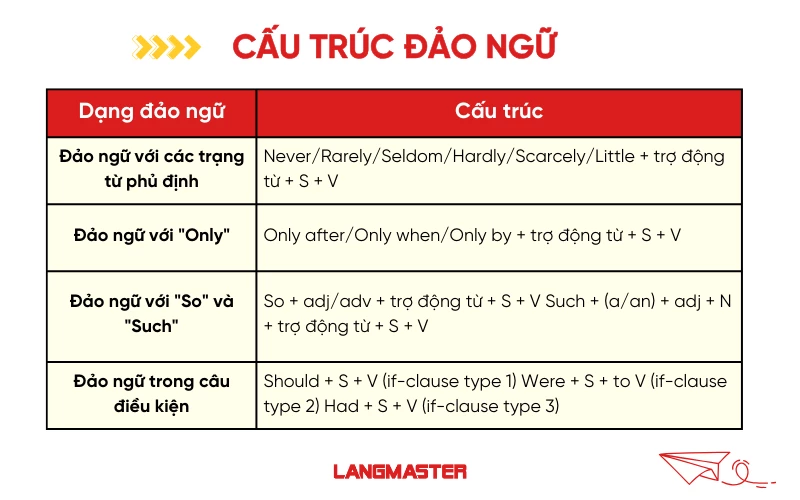
Chức năng của câu đảo ngữ:
Câu đảo ngữ có ba chức năng chính: nhấn mạnh ý nghĩa, tạo sắc thái trang trọng, và đa dạng hóa cách diễn đạt. Khi sử dụng đảo ngữ, người nói có thể làm nổi bật một sự kiện đặc biệt hoặc nhấn mạnh mức độ hiếm hoi của một sự việc. Chẳng hạn: "Never have I seen such a beautiful sunset." (Chưa bao giờ tôi thấy hoàng hôn đẹp như vậy).
Bên cạnh đó, đảo ngữ cũng giúp câu văn mang sắc thái trang trọng hơn, thường xuất hiện trong văn bản học thuật, bài phát biểu hoặc tin tức chính thống, ví dụ: "Little did he know about the consequences of his actions." (Anh ấy ít biết về hậu quả của hành động mình).
Ngoài ra, việc sử dụng đảo ngữ còn giúp làm phong phú cách diễn đạt trong văn viết và giao tiếp, giúp câu văn không bị lặp đi lặp lại theo cấu trúc thông thường, tạo điểm nhấn mạnh mẽ hơn.
1.2. Các dạng câu đảo ngữ trong tiếng Anh
1.2.1 Đảo ngữ với các trạng từ phủ định: "Never, Rarely, Seldom, Hardly, Scarcely, Little"
Cấu trúc:
|
Never/Rarely/Seldom/Hardly/Scarcely/Little + trợ động từ + S + V |
Ví dụ:
- Câu thường: I have never seen such a wonderful performance. (Tôi chưa bao giờ thấy một màn trình diễn tuyệt vời như vậy.)
- Câu đảo ngữ: Never have I seen such a wonderful performance. (Chưa bao giờ tôi thấy một màn trình diễn tuyệt vời như vậy.)
Cách dùng:
- Dùng để nhấn mạnh sự hiếm hoi hoặc chưa từng xảy ra của một sự việc.
- Thường gặp trong văn phong trang trọng, bài viết học thuật hoặc bài phát biểu.
1.2.2 Đảo ngữ với "only"
Cấu trúc:
|
Only after/Only when/Only by + trợ động từ + S + V |
Ví dụ:
- Câu thường: She realized the importance of education only after she graduated. (Cô ấy mới nhận ra tầm quan trọng của giáo dục sau khi tốt nghiệp.)
- Câu đảo ngữ: Only after she graduated did she realize the importance of education. (Chỉ sau khi tốt nghiệp, cô ấy mới nhận ra tầm quan trọng của giáo dục.)
Cách dùng:
- Nhấn mạnh điều kiện hoặc hoàn cảnh dẫn đến một sự việc.
- Được sử dụng phổ biến trong văn phong học thuật.
>> Xem thêm: Cấu trúc Not Only But Also: Cách dùng và công thức đảo ngữ
1.2.3 Đảo ngữ với "so" và "such"
Cấu trúc:
|
So + adj/adv + trợ động từ + S + V |
Ví dụ:
- Câu thường: The challenge was so difficult that few people could solve it. (Thử thách quá khó đến mức rất ít người có thể giải quyết.)
- Câu đảo ngữ: So difficult was the challenge that few people could solve it. (Khó đến mức rất ít người có thể giải quyết thử thách đó.)
Cách dùng:
- Nhấn mạnh mức độ của một tính từ hoặc danh từ.
- Thường gặp trong văn viết trang trọng.
1.2.4 Đảo ngữ trong câu điều kiện
Cấu trúc:
|
Should + S + V (if-clause type 1) |
Ví dụ:
- Câu thường: If you need any help, please call me. (Nếu bạn cần giúp đỡ, hãy gọi tôi.)
- Câu đảo ngữ: Should you need any help, please call me. (Nếu bạn cần giúp đỡ, hãy gọi tôi.)
Cách dùng:
- Giúp câu văn ngắn gọn, súc tích hơn.
- Phổ biến trong văn viết trang trọng hoặc các bài luận học thuật.
>> Xem thêm: Đảo Ngữ Câu Điều Kiện: Định Nghĩa, Công Thức, Cách Dùng, Bài Tập
2. Bài tập câu đảo ngữ
Bài tập 1: Rewrite the following sentences so that the meaning is not changed
(Viết lại câu sao cho nghĩa không thay đổi, sử dụng câu đảo ngữ.)
- I have never seen such an interesting movie.
- She rarely goes out at night.
- He little realized the consequences of his actions.
- We seldom meet such generous people.
- They hardly ever complain about the service.
- She has never spoken to me in such a rude manner.
- I rarely have free time on weekends.
- He little understood what was happening around him.
- She had never felt so happy before.
- We barely had time to react.
- I have never visited such a beautiful place.
- He hardly spoke a word during the meeting.
- We had never heard such a touching story.
- She seldom eats fast food.
- They little suspected that their plan would fail.
- I have rarely seen such a spectacular view.
- She had never been so frightened.
- We have never been to such an exciting event.
- He little expected to win the competition.
- We seldom see such honesty in business.
Bài tập 2: Rewrite these sentences, using inversion with So or Such
(Viết lại câu, sử dụng đảo ngữ với "So" hoặc "Such".)
- The weather was so hot that we couldn’t go outside.
- The test was so difficult that many students failed.
- He is such a talented musician that everyone admires him.
- The mountain was so high that we couldn’t climb it.
- The story was so touching that she started crying.
- The speech was so inspiring that the audience gave a standing ovation.
- The cake was so delicious that we ate it all.
- She is such a kind-hearted person that everyone loves her.
- The river was so wide that we couldn’t swim across.
- The book was so interesting that I read it in one night.
- The road was so narrow that only one car could pass.
- The situation was so serious that immediate action was required.
- The storm was so strong that trees were uprooted.
- It was such a cold night that we had to stay indoors.
- The music was so loud that we couldn't hear each other.
- The show was so amazing that the audience couldn’t stop clapping.
- He is such a responsible student that teachers trust him.
- The problem was so complicated that few people could solve it.
- The company was so successful that it expanded worldwide.
- The baby was so cute that everyone wanted to hold him.
Bài tập 3: Rewrite these sentences, using inversion with Only
(Viết lại câu, sử dụng đảo ngữ với "Only".)
- I realized my mistake only after he left.
- She started crying only when she saw her mother.
- He could finish the project only by working late at night.
- We found out the truth only after reading the report.
- You will understand the importance of education only when you start working.
- The police arrested the suspect only after gathering enough evidence.
- She could pass the test only by studying hard.
- He managed to escape only by breaking the window.
- We achieved success only when we worked together.
- She could reach her goals only through determination.
- I started enjoying the movie only after the first 30 minutes.
- He became famous only after his third novel.
- They built the house only after receiving permission.
- We realized the issue only after the system crashed.
- She spoke up only when everyone remained silent.
- He made a decision only after consulting his mentor.
- The car started only when he fixed the engine.
- The contract was signed only after several negotiations.
- The audience applauded only when the performer bowed.
- They agreed to the proposal only after reviewing all the details.
>> Xem thêm:
- Tổng hợp bài tập từ loại đầy đủ, chi tiết nhất có đáp án
- 100+ Câu bài tập Modal Verb đầy đủ, có đáp án chi tiết nhất
Bài tập 4: Rewrite these conditional sentences using inversion
(Viết lại các câu điều kiện dưới dạng đảo ngữ.)
- If I had known about the meeting, I would have attended.
- If she were in your position, she would accept the offer.
- If you need any assistance, please call me.
- If we had taken a taxi, we wouldn’t have been late.
- If he had listened to my advice, he wouldn’t be in trouble now.
- If they had worked harder, they would have passed the exam.
- If you study hard, you will succeed.
- If the train had arrived on time, we wouldn’t have missed our flight.
- If she had spoken more clearly, we would have understood her.
- If I were rich, I would travel the world.
- If the weather improves, we will go on a picnic.
- If I had seen the warning sign, I wouldn’t have entered the building.
- If he had apologized, she would have forgiven him.
- If the government takes action, pollution will be reduced.
- If we were given another chance, we would do better.
- If you had been more careful, you wouldn’t have lost your wallet.
- If she calls me, I will answer.
- If the company had invested more, it would have grown faster.
- If I were you, I wouldn’t take that risk.
- If they had known the truth, they would have reacted differently.
Bài tập 5: Choose the correct answer A, B, or C
(Chọn đáp án đúng.)
- ___ had he arrived than the meeting started.
A. No sooner
B. Hardly
C. Only - ___ did we expect such a huge success.
A. Seldom
B. Often
C. Always - ___ had the bell rung when the students rushed out.
A. No sooner
B. Rarely
C. Usually - ___ have I seen such an interesting movie.
A. Never
B. Always
C. Sometimes - ___ was the show that everyone stood up and applauded.
A. Such interesting
B. So interesting
C. Very interesting - ___ had I known the truth, I would have acted differently.
A. Should
B. Had
C. Were - ___ was the impact of the speech that people were deeply moved.
A. So great
B. Such great
C. Too great - ___ did she understand the importance of discipline.
A. Only after
B. Often
C. Usually - ___ was the book that it became an instant bestseller.
A. Such a great
B. So great
C. Too great - ___ does she call her parents, although she loves them dearly.
A. Rarely
B. Always
C. Usually - ___ had the plane taken off when the storm started.
A. No sooner
B. Seldom
C. Only - ___ did they decide to change their plan.
A. Hardly
B. Rarely
C. Only then - ___ is the situation that we must act immediately.
A. So serious
B. Such serious
C. Very serious - ___ had we entered the building than the alarm went off.
A. Hardly
B. No sooner
C. Seldom - ___ have we witnessed such dedication in an employee.
A. Never
B. Always
C. Often - ___ had he apologized when she forgave him.
A. No sooner
B. Rarely
C. Only - ___ had I finished the exam than the bell rang.
A. No sooner
B. Seldom
C. Only when - ___ did they understand the significance of the event.
A. Only after
B. Often
C. Sometimes - ___ was the challenge that few people dared to take it.
A. So great
B. Such great
C. Very great - ___ had the manager entered when the meeting started.
A. Hardly
B. No sooner
C. Rarely
Bài tập 6: Give the correct form of the verbs in the blankets
(Chia động từ đúng trong ngoặc.)
- Never ___ (I/see) such an impressive performance.
- Rarely ___ (he/visit) his parents.
- Only after the meeting ___ (she/realize) the importance of the issue.
- Hardly ___ (we/finish) our meal when the waiter brought the bill.
- So difficult ___ (be) the test that many students gave up.
- Seldom ___ (they/witness) such a strange phenomenon.
- Not until she apologized ___ (he/forgive) her.
- No sooner ___ (they/leave) than the storm began.
- Little ___ (she/know) about what was going to happen.
- Were I ___ (be) you, I wouldn’t make that mistake.
- Hardly ever ___ (we/see) such professionalism in customer service.
- Only if he ___ (try) harder will he succeed.
- So exhausted ___ (she/be) that she fell asleep immediately.
- Under no circumstances ___ (you/leave) your belongings unattended.
- Rarely ___ (they/complain) about their working conditions.
- No sooner ___ (he/sit) down than the phone rang.
- Should you ___ (need) further assistance, do not hesitate to ask.
- Never before ___ (the team/play) such an intense match.
- Had I ___ (know) about the offer, I would have applied earlier.
- Little ___ (he/expect) that he would win the lottery.
Bài tập 7: Mark the letter A, B, C, or D to indicate the bolded part that needs correction in each of the following questions
(Đánh dấu chữ cái A, B, C hoặc D để chỉ ra phần in đậm cần sửa trong mỗi câu hỏi sau.)
- Not only (A) did the mad man refuse to take (B) the pills but also (C) attacked the nurses (D).
- No sooner had he got (A) home when (B) he was called back to (C) the office (D).
- Never before (A) she has seen (B) such an amazing sight like this (C) in her life before (D).
- Hardly had they finished (A) the meeting than (B) another problem came up (C) for discussion by the board (D).
- Seldom (A) in my life I have met (B) such an inspiring teacher like (C) Professor Johnson before (D).
- Only when (A) he left home he realized (B) that he had forgotten his phone (C) on the table in the kitchen (D).
- No sooner (A) she had stepped** (B) outside than it began (C) to rain heavily on the street (D).
- Under no circumstances (A) you should leave (B) the car unlocked (C) while parking in the city (D).
- Rarely does (A) he speak about (B) his achievements because (C) he is so modest (D).
- Little do (A) the students realize how much effort (B) their teacher puts into (C) preparing each lesson (D).
- Not until (A) he had explained the situation we understood (B) why he was upset about (C) the decision of the manager (D).
- So fast (A) the car was that it could hardly (B) be seen on the highway (C) yesterday morning (D).
- Never again (A) I will trust a stranger (B) with my personal information on social media (C).
- Not only (A) the students enjoyed (B) the lesson, but they also found (C) it extremely useful (D).
- No sooner (A) had she arrived (B) at the airport when she realized (C) she had forgotten her passport (D).
- Only after (A) I had checked the report I realized (B) the mistake in the calculations (C).
- Seldom (A) I have seen such dedication (B) in a young scientist before (C).
- Hardly (A) had the meeting started than (B) the fire alarm went off (C).
- Rarely (A) has she been to such (B) an interesting museum in her travels (C).
- Little (A) did they knew that (B) their decision would lead to (C) such serious consequences later (D).
>> Xem thêm:
- Bài tập đặt câu hỏi cho từ gạch chân trong tiếng Anh kèm đáp án
- Các cụm giới từ thông dụng trong tiếng Anh kèm bài tập vận dụng
3. Đáp án bài tập câu đảo ngữ
Bài tập 1: Viết lại câu sao cho nghĩa không thay đổi, sử dụng câu đảo ngữ.
- Never have I seen such an interesting movie.
- Rarely does she go out at night.
- Little did he realize the consequences of his actions.
- Seldom do we meet such generous people.
- Hardly ever do they complain about the service.
- Never has she spoken to me in such a rude manner.
- Rarely do I have free time on weekends.
- Little did he understand what was happening around him.
- Never had she felt so happy before.
- Barely did we have time to react.
- Never have I visited such a beautiful place.
- Hardly did he speak a word during the meeting.
- Never had we heard such a touching story.
- Seldom does she eat fast food.
- Little did they suspect that their plan would fail.
- Rarely have I seen such a spectacular view.
- Never had she been so frightened.
- Never have we been to such an exciting event.
- Little did he expect to win the competition.
- Seldom do we see such honesty in business.
Bài tập 2: Viết lại câu, sử dụng đảo ngữ với "So" hoặc "Such".
- So hot was the weather that we couldn’t go outside.
- So difficult was the test that many students failed.
- Such a talented musician was he that everyone admires him.
- So high was the mountain that we couldn’t climb it.
- So touching was the story that she started crying.
- So inspiring was the speech that the audience gave a standing ovation.
- So delicious was the cake that we ate it all.
- Such a kind-hearted person was she that everyone loves her.
- So wide was the river that we couldn’t swim across.
- So interesting was the book that I read it in one night.
- So narrow was the road that only one car could pass.
- So serious was the situation that immediate action was required.
- So strong was the storm that trees were uprooted.
- Such a cold night was it that we had to stay indoors.
- So loud was the music that we couldn't hear each other.
- So amazing was the show that the audience couldn’t stop clapping.
- Such a responsible student was he that teachers trust him.
- So complicated was the problem that few people could solve it.
- So successful was the company that it expanded worldwide.
- So cute was the baby that everyone wanted to hold him.
Bài tập 3: Viết lại câu, sử dụng đảo ngữ với "Only".
- Only after he left did I realize my mistake.
- Only when she saw her mother did she start crying.
- Only by working late at night could he finish the project.
- Only after reading the report did we find out the truth.
- Only when you start working will you understand the importance of education.
- Only after gathering enough evidence did the police arrest the suspect.
- Only by studying hard could she pass the test.
- Only by breaking the window did he manage to escape.
- Only when we worked together did we achieve success.
- Only through determination could she reach her goals.
- Only after the first 30 minutes did I start enjoying the movie.
- Only after his third novel did he become famous.
- Only after receiving permission did they build the house.
- Only after the system crashed did we realize the issue.
- Only when everyone remained silent did she speak up.
- Only after consulting his mentor did he make a decision.
- Only when he fixed the engine did the car start.
- Only after several negotiations was the contract signed.
- Only when the performer bowed did the audience applaud.
- Only after reviewing all the details did they agree to the proposal.
>> Xem thêm:
- Tổng hợp bài tập câu bị động đặc biệt có đáp án
- Tổng hợp bài tập câu điều kiện loại 1, 2, 3 có đáp án chi tiết
Bài tập 4: Viết lại các câu điều kiện dưới dạng đảo ngữ.
- Had I known about the meeting, I would have attended.
- Were she in your position, she would accept the offer.
- Should you need any assistance, please call me.
- Had we taken a taxi, we wouldn’t have been late.
- Had he listened to my advice, he wouldn’t be in trouble now.
- Had they worked harder, they would have passed the exam.
- Should you study hard, you will succeed.
- Had the train arrived on time, we wouldn’t have missed our flight.
- Had she spoken more clearly, we would have understood her.
- Were I rich, I would travel the world.
- Should the weather improve, we will go on a picnic.
- Had I seen the warning sign, I wouldn’t have entered the building.
- Had he apologized, she would have forgiven him.
- Should the government take action, pollution will be reduced.
- Were we given another chance, we would do better.
- Had you been more careful, you wouldn’t have lost your wallet.
- Should she call me, I will answer.
- Had the company invested more, it would have grown faster.
- Were I you, I wouldn’t take that risk.
- Had they known the truth, they would have reacted differently.
Bài tập 5: Chọn đáp án đúng
- A. No sooner
- A. Seldom
- A. No sooner
- A. Never
- B. So interesting
- B. Had
- A. So great
- A. Only after
- A. Such a great
- A. Rarely
- A. No sooner
- C. Only then
- A. So serious
- B. No sooner
- A. Never
- A. No sooner
- A. No sooner
- A. Only after
- A. So great
- B. No sooner
Bài tập 6: Chia động từ đúng trong ngoặc.
- Never have I seen such an impressive performance.
- Rarely does he visit his parents.
- Only after the meeting did she realize the importance of the issue.
- Hardly had we finished our meal when the waiter brought the bill.
- So difficult was the test that many students gave up.
- Seldom have they witnessed such a strange phenomenon.
- Not until she apologized did he forgive her.
- No sooner had they left than the storm began.
- Little did she know about what was going to happen.
- Were I to be you, I wouldn’t make that mistake.
- Hardly ever do we see such professionalism in customer service.
- Only if he tries harder will he succeed.
- So exhausted was she that she fell asleep immediately.
- Under no circumstances should you leave your belongings unattended.
- Rarely do they complain about their working conditions.
- No sooner had he sat down than the phone rang.
- Should you need further assistance, do not hesitate to ask.
- Never before had the team played such an intense match.
- Had I known about the offer, I would have applied earlier.
- Little did he expect that he would win the lottery.
Bài tập 7: Đánh dấu chữ cái A, B, C hoặc D để chỉ ra phần gạch chân cần sửa trong mỗi câu.
- (D) "attacked" → "did he attack" (Động từ chính phải theo trợ động từ "did" trong câu đảo ngữ.)
- (B) "when" → "than" (Cấu trúc đúng là "No sooner... than...")
- (B) "has seen" → "had she seen" (Câu đảo ngữ cần đảo trợ động từ "had" trước chủ ngữ.)
- (B) "than" → "when" (Cấu trúc đúng là "Hardly... when...")
- (B) "I have met" → "have I met" (Trong câu đảo ngữ, trợ động từ đứng trước chủ ngữ.)
- (B) "he realized" → "did he realize" (Cấu trúc đảo ngữ yêu cầu trợ động từ "did".)
- (B) "she had stepped" → "had she stepped" (Đảo ngữ yêu cầu động từ chính đứng sau trợ động từ "had".)
(B) "you should leave" → "should you leave" (Trong câu đảo ngữ, trợ động từ đứng trước chủ ngữ.) - → Đáp án đúng, không có lỗi.
- → Đáp án đúng, không có lỗi.
- (B) "we understood" → "did we understand" (Câu đảo ngữ cần trợ động từ "did".)
- (A) "So fast the car was" → "So fast was the car" (Câu đảo ngữ với "So" cần đảo động từ lên trước chủ ngữ.)
- (A) "I will trust" → "will I trust" (Câu đảo ngữ yêu cầu đảo trợ động từ "will" lên trước chủ ngữ.)
- (A) "the students enjoyed" → "did the students enjoy" (Câu đảo ngữ cần trợ động từ "did".)
- (C) "when" → "than" (Cấu trúc đúng là "No sooner... than...")
- (B) "I realized" → "did I realize" (Câu đảo ngữ cần trợ động từ "did".)
- (A) "I have seen" → "have I seen" (Trợ động từ cần đứng trước chủ ngữ trong câu đảo ngữ.)
- (B) "than" → "when" (Cấu trúc đúng là "Hardly... when...")
- → Đáp án đúng, không có lỗi.
- (B) "did they knew that" → "did they know that" (Động từ sau trợ động từ "did" phải ở dạng nguyên mẫu.)
Kết luận
Câu đảo ngữ là một chủ điểm ngữ pháp quan trọng giúp câu văn trở nên linh hoạt, trang trọng và nhấn mạnh ý nghĩa hơn. Qua bài viết này, bạn đã được ôn tập lại toàn bộ lý thuyết về câu đảo ngữ và luyện tập với hơn 100 bài tập đảo ngữ có đáp án chi tiết. Việc luyện tập thường xuyên sẽ giúp bạn nắm vững cách sử dụng đảo ngữ trong cả văn viết và giao tiếp. Hãy tiếp tục thực hành với các bài tập mở rộng để cải thiện kỹ năng tiếng Anh của mình. Chúc bạn học tốt!
Học tiếng Anh luôn là một quá trình đòi hỏi sự kiên trì và nỗ lực của chính bản thân, nếu bạn đang tìm một địa chỉ học tiếng Anh uy tín thì Langmaster sẽ là lựa chọn đáng tin cậy giúp bạn nhanh chóng chinh phục tiếng Anh giao tiếp. Với hơn 15 năm kinh nghiệm giảng dạy và truyền cảm hứng học tiếng Anh cho hơn 800.000+ học viên, Langmaster tự tin đem lại những khóa học chất lượng có cam kết đầu ra chuẩn CERF. Các bạn học viên sẽ được dẫn dắt bởi đội ngũ giáo viên có chuyên môn cao cùng phương pháp giảng dạy hiện đại, độc quyền, giúp bạn nhanh chóng nâng trình tiếng Anh của bản thân.
Đăng ký học thử miễn phí ngay tại đây để trải nghiệm phương pháp giảng dạy độc quyền tại Langmaster nhé!
>> ĐĂNG KÝ CÁC KHÓA HỌC TIẾNG ANH
- Khóa học tiếng Anh giao tiếp TRỰC TUYẾN 1 kèm 1
- Khóa học tiếng Anh giao tiếp dành riêng cho người đi làm
- Khóa học tiếng Anh giao tiếp TRỰC TUYẾN NHÓM
- Test trình độ tiếng Anh miễn phí
- Đăng ký nhận tài liệu tiếng Anh
Đăng ký tham gia ngay Chuỗi Webinar "Siêu Phản Xạ" – Tiếng Anh giao tiếp cho người đi làm chính là chìa khóa giúp bạn bứt phá!
Lợi ích khi tham gia:
- Luyện phản xạ nhanh qua các tình huống công sở thực tế.
- Giảng viên giàu kinh nghiệm, hỗ trợ sửa lỗi phát âm ngay trong buổi học
- 100% miễn phí, học online linh hoạt, dễ dàng tham gia dù bạn bận rộn
- Áp dụng ngay vào công việc, giúp bạn tự tin giao tiếp với đối tác nước ngoài
Thời gian: 20h tối thứ 4 hàng tuần
Hình thức: Học qua Zoom – Đăng ký ngay để không bỏ lỡ!
Với phương pháp Siêu Phản Xạ độc quyền, bạn sẽ học cách nghe – hiểu – phản xạ dưới 3 giây, diễn đạt tiếng Anh tự nhiên như bản năng mà không cần suy nghĩ dịch từng từ. Nội dung khóa học được thiết kế chuyên biệt cho môi trường công sở, giúp bạn thành thạo giao tiếp trong các cuộc họp, thuyết trình, xử lý tình huống thực tế và tương tác chuyên nghiệp với đồng nghiệp, khách hàng quốc tế.
Nội Dung Hot
KHÓA TIẾNG ANH GIAO TIẾP 1 KÈM 1
- Học và trao đổi trực tiếp 1 thầy 1 trò.
- Giao tiếp liên tục, sửa lỗi kịp thời, bù đắp lỗ hổng ngay lập tức.
- Lộ trình học được thiết kế riêng cho từng học viên.
- Dựa trên mục tiêu, đặc thù từng ngành việc của học viên.
- Học mọi lúc mọi nơi, thời gian linh hoạt.
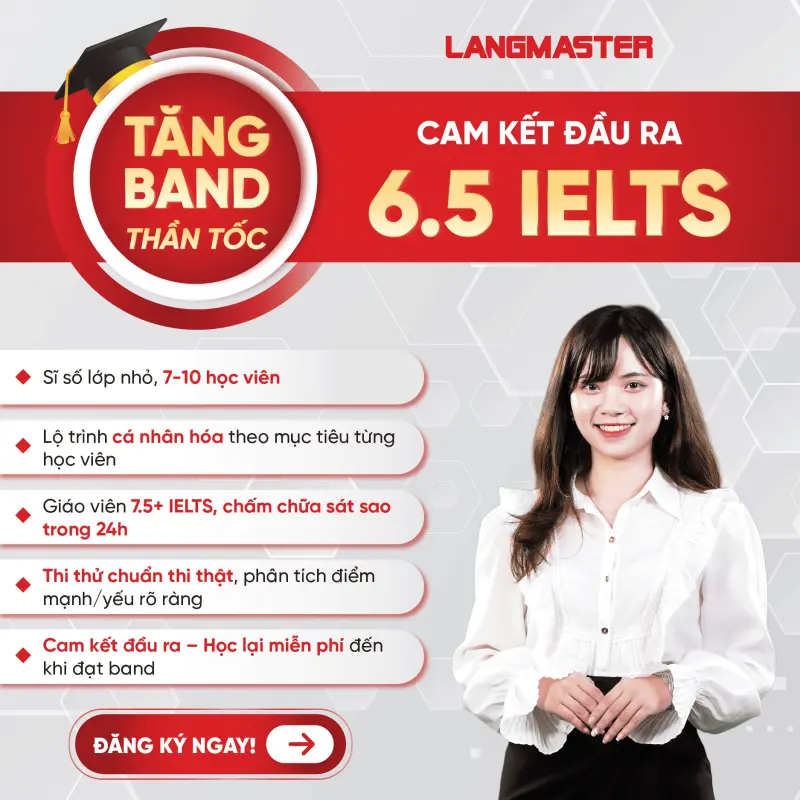
KHÓA HỌC IELTS ONLINE
- Sĩ số lớp nhỏ (7-10 học viên), đảm bảo học viên được quan tâm đồng đều, sát sao.
- Giáo viên 7.5+ IELTS, chấm chữa bài trong vòng 24h.
- Lộ trình cá nhân hóa, coaching 1-1 cùng chuyên gia.
- Thi thử chuẩn thi thật, phân tích điểm mạnh - yếu rõ ràng.
- Cam kết đầu ra, học lại miễn phí.

KHÓA TIẾNG ANH TRẺ EM
- Giáo trình Cambridge kết hợp với Sách giáo khoa của Bộ GD&ĐT hiện hành
- 100% giáo viên đạt chứng chỉ quốc tế IELTS 7.0+/TOEIC 900+
- X3 hiệu quả với các Phương pháp giảng dạy hiện đại
- Lộ trình học cá nhân hóa, con được quan tâm sát sao và phát triển toàn diện 4 kỹ năng
Bài viết khác
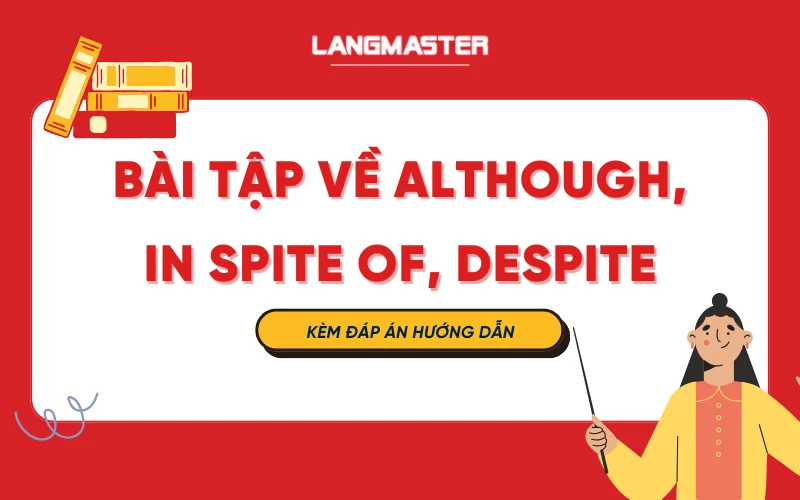
Tổng hợp bài tập về Although, In spite of, Despite kèm đáp án trọng tâm về Although, In spite of, Despite. Bài tập Although, In spite of, Despite lớp 7, bài tập lớp 9
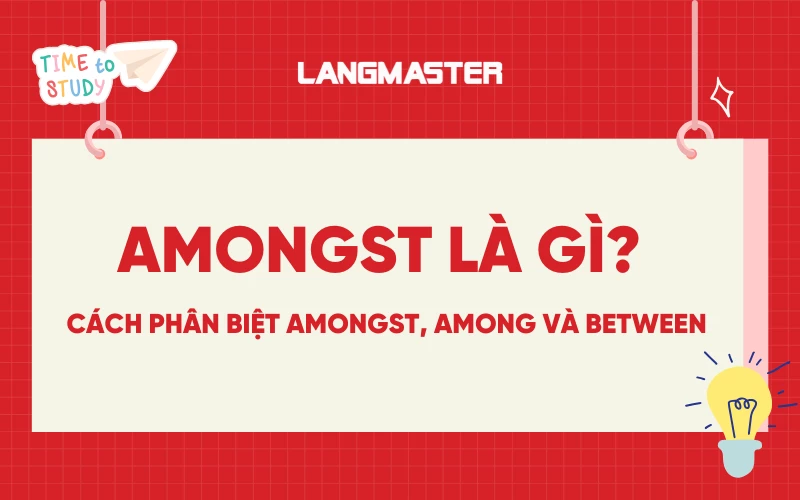
Bạn đang bối rối khi sử dụng amongst, among và between trong tiếng Anh? Trong bài viết này, Langmaster sẽ giúp bạn tìm hiểu amongst là gì, cách phân biệt với among và between kèm ví dụ chi tiết nhất.
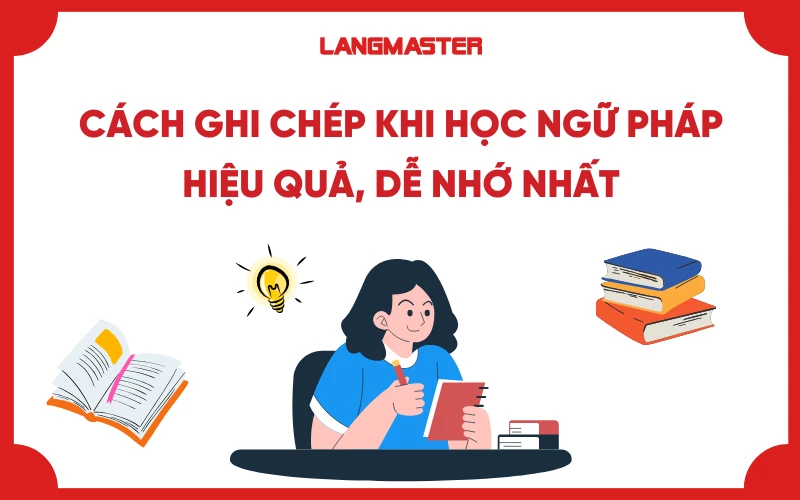
Hướng dẫn chi tiết cách ghi chép khi học ngữ pháp giúp ghi nhớ lâu, hệ thống hóa kiến thức ngữ pháp tiếng Anh và áp dụng dễ dàng vào giao tiếp, viết luận.
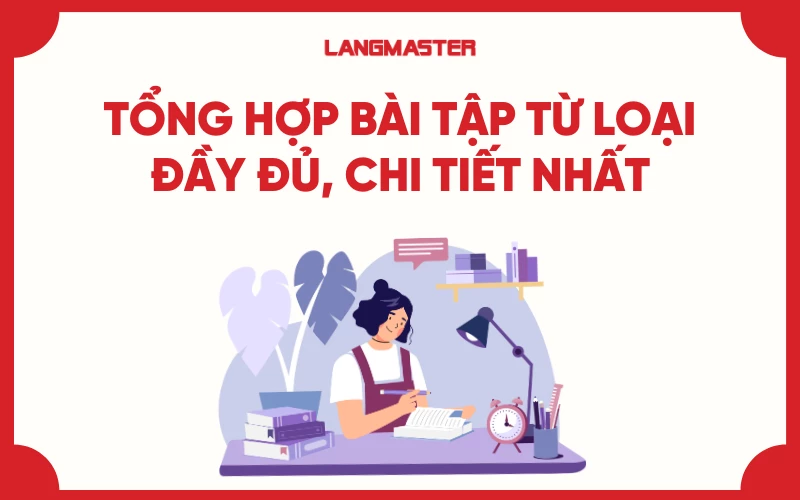
Tổng hợp 100+ câu bài tập từ loại đầy đủ, chi tiết nhất có đáp án. Hệ thống bài tập từ loại tiếng Anh cơ bản và nâng cao giúp bạn hiểu rõ cách sử dụng từ loại chính xác.
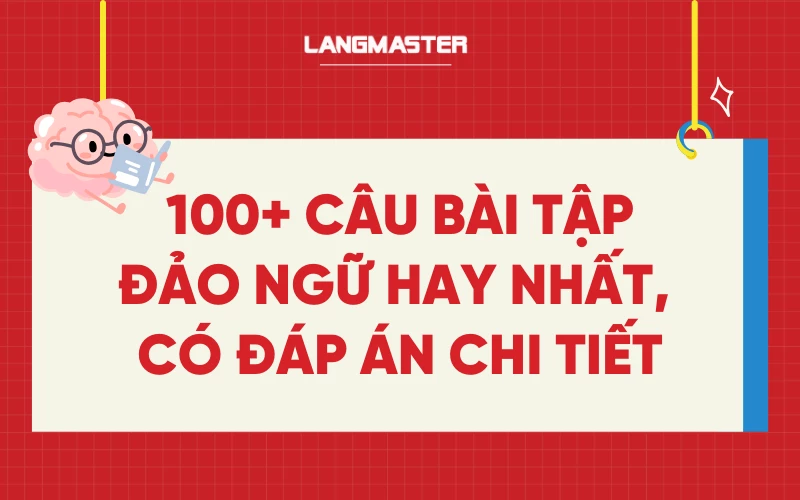
Luyện tập lý thuyết câu đảo ngữ qua bộ 100+ câu bài tập đảo ngữ hay nhất, đầy đủ các dạng kèm đáp án chi tiết.

